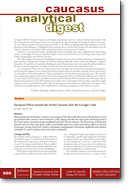Oppositional Islam in Azerbaijan

Author(s): Sofie Bedford
Editor(s): Sofie Bedford, Lili Di Puppo, Iris Kempe, Heiko Pleines, Matthias Neumann, Robert Orttung, Jeronim Perovic
Series: Caucasus Analytical Digest (CAD)
Issue: 44
Pages: 9-11
Publisher(s): Center for Security Studies (CSS), ETH Zurich; Research Centre for East European Studies, University of Bremen; Institute for European, Russian and Eurasian Studies, George Washington University
Publication Year: 2012
